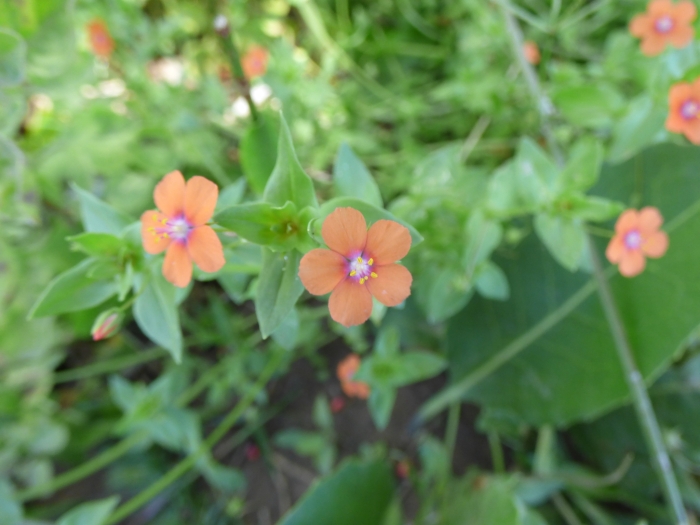Scarlet Pimpernel
(Lysimachia arvensis)
Scarlet Pimpernel (Lysimachia arvensis)
/
/

© María Zeta
CC BY 4.0
Image By:
© María Zeta
Recorded By:
Copyright:
CC BY 4.0
Copyright Notice:
Photo by: © María Zeta | License Type: CC BY 4.0 | License URL: http://creativecommons.org/licenses/by/4.0/ | Uploader: mariazeta | Publisher: iNaturalist |

























Estimated Native Range
Summary
Lysimachia arvensis, commonly known as Scarlet Pimpernel, is an annual herb native to Europe, Western Asia, and North Africa, but now naturalized worldwide. It thrives in a variety of habitats including light soils, agricultural margins, hedges, fields, and open woodlands. The plant typically grows to a height of 5-30 cm, with a sprawling habit that can cover ground quickly. The leaves are ovate and the stems are square and trailing. Scarlet Pimpernel is known for its small, vibrant flowers which can be scarlet, blue, or pink, blooming from spring to autumn. The flowers are radially symmetric and open only when the sun shines, closing in dull weather.
Scarlet Pimpernel is valued for its bright, showy flowers and is often used in wildflower gardens and as a ground cover in informal settings. It is easy to grow and can thrive in poor, sandy, or gravelly soils with good drainage. It prefers full sun but can tolerate partial shade. While it is drought-tolerant, moderate watering will encourage more prolific flowering. However, gardeners should be cautious as it is toxic to livestock and can become invasive, outcompeting native plants. In folk medicine, it has been used to treat various ailments, although its medicinal efficacy is not well-documented. Due to its invasive potential, it is important to check local regulations before planting it outside its native range.CC BY-SA 4.0
Scarlet Pimpernel is valued for its bright, showy flowers and is often used in wildflower gardens and as a ground cover in informal settings. It is easy to grow and can thrive in poor, sandy, or gravelly soils with good drainage. It prefers full sun but can tolerate partial shade. While it is drought-tolerant, moderate watering will encourage more prolific flowering. However, gardeners should be cautious as it is toxic to livestock and can become invasive, outcompeting native plants. In folk medicine, it has been used to treat various ailments, although its medicinal efficacy is not well-documented. Due to its invasive potential, it is important to check local regulations before planting it outside its native range.CC BY-SA 4.0
Plant Description
- Plant Type: Herb
- Height: 0.75-0.75 feet
- Width: 1-2 feet
- Growth Rate: Rapid
- Flower Color: Orange, Blue, Purple, White
- Flowering Season: Spring, Summer, Fall
- Leaf Retention:
Growth Requirements
- Sun: Full Sun
- Water: Medium
- Drainage: Medium, Fast
Common Uses
Border Plant, Low Maintenance
Natural Habitat
Native to Europe, Western Asia, and North Africa, thriving in light soils, agricultural margins, hedges, fields, and open woodlands
Other Names
Common Names: Poor Man’s Barometer, Common Pimpernel, Poor Man’s Weatherglass, Red Chickweed
Scientific Names: , Lysimachia arvensis, Anagallis arvensis subsp. arvensis, Anagallis arvensis var. arvensis, Anagallis phoenicia,
GBIF Accepted Name: